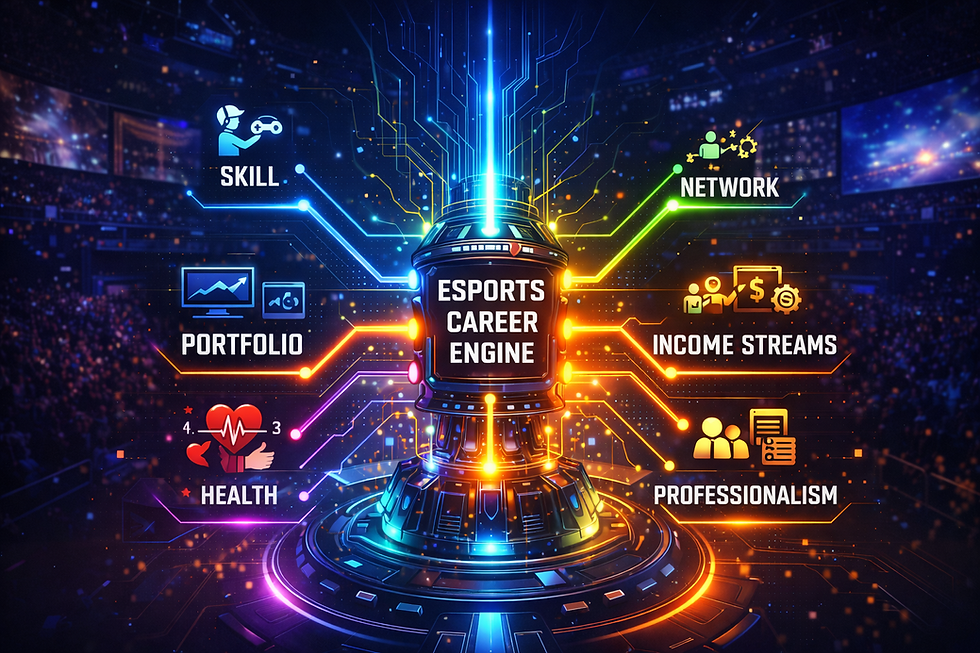How ESPORTS Can Boost Mental Health: Insights and Benefits
- Dr. Brian J

- May 18, 2024
- 5 min read
©2024

Mental health is an essential aspect of overall well-being, and understanding how to maintain it is crucial, especially for younger generations. With the rise of ESPORTS, many have begun to explore how this popular activity can contribute positively to mental health. ESPORTS, much like traditional sports, can offer significant benefits by fostering social connections, building essential life skills, and creating inclusive communities.
The Role of ESPORTS in Mental Health
Creating a Sense of Community
One of the primary benefits of ESPORTS is its ability to create a sense of community among participants. Jon Chapman, CEO of PlayVS, a leading youth ESPORTS platform, emphasizes that for many students, ESPORTS is their first experience with extracurricular activities. This exposure helps them build community and camaraderie, essential components of mental well-being.
The statistics support this claim. Chapman points out that for 46% of students participating in PlayVS ESPORTS programs, it is their first extracurricular activity. This means that ESPORTS is their first exposure to structured social interactions, which can be profoundly impactful. By participating in ESPORTS, students find a community of peers who share similar interests, which can significantly enhance their social skills and overall sense of belonging.
Skill Development
ESPORTS also helps students develop critical skills such as leadership, communication, and teamwork. These are crucial for personal and professional growth. Chapman notes that ESPORTS participation provides students with their first taste of winning and losing in a supportive environment, similar to traditional sports. This helps build resilience and confidence.
In addition, ESPORTS requires strategic thinking and problem-solving, skills that are valuable both in and out of the gaming context. Students learn to analyze situations, develop strategies, and adapt to changing circumstances. These skills can translate into academic success and future career opportunities, making ESPORTS an excellent tool for holistic development.
Dispelling the Stigma Around Esports
Despite its growing acceptance, ESPORTS still faces some stigma. Critics often view gaming as an isolating activity. However, it's important to distinguish between solo gaming and ESPORTS which often involve team-based competition. Educating parents and teachers about the differences can help create more supportive environments for young gamers.
Kristin Anderson, co-founder of FITGMR, a player development platform, points out that ESPORTS, contrary to popular belief, are highly social. Players often communicate and strategize with teammates, which can be a powerful bonding experience. The field for their game is on their screen, and at any given time, there could be 5-10 others present, collaborating and competing together. This dynamic fosters teamwork and camaraderie, countering the notion that gaming is inherently isolating.
Anderson also highlights the importance of educating the broader community about the differences between gaming and ESPORTS. By doing so, we can help dispel misconceptions and create a more inclusive environment for ESPORTS enthusiasts. Providing information about the team nature of ESPORTS, the various roles within games, and the importance of communication can help change perceptions and promote a more positive view of ESPORTS.
ESPORTS as a Tool for Mental Health
ESPORTS can serve as a positive outlet for stress and anxiety. Gaming in moderation can provide escapism and mental relaxation. FITGMR has partnered with mental health charity ShawMind to offer tools and skills through gaming, aimed at improving youth mental health.
The partnership aims to provide young gamers with the resources they need to manage their mental health effectively. This includes educational materials, workshops, and support systems designed to help students navigate the challenges they may face. By integrating mental health support into ESPORTS programs, organizations like FITGMR and ShawMind are helping to create a more holistic approach to youth development.
Beyond mental health, ESPORTS competitions also provide valuable transferable skills. Research by the Connected Learning Lab at UC Irvine, in collaboration with NASEF, found significant improvements in communication, strategy, and general life skills among students involved in ESPORTS. Parents reported a 62% improvement in general life skills, a 38% increase in communication abilities, and a 31% improvement in strategic thinking. These findings highlight the potential of esports to positively impact various aspects of a young person's life.
Building Supportive Esports Structures
PlayVS has been instrumental in creating competitive ESPORTS structures in US high schools. These include leagues and tournaments for games like Super Smash Bros., Rocket League, and League of Legends. To ensure these activities do not negatively impact mental health, PlayVS has a dedicated team to monitor and maintain healthy competition environments.
Chapman highlights the importance of creating healthy habits and developing skills from a young age. This is why PlayVS has expanded into middle schools, aiming to instill positive behaviors early on. By providing structured and supportive environments, PlayVS helps students develop the skills and habits that will serve them well throughout their lives.
The PlayVS team is also committed to preventing negative behaviors such as toxicity and burnout. They moderate matches, observe communication, and enforce rules to create a safe and positive environment for all participants. This proactive approach helps ensure that esports remains a healthy and enjoyable activity for students.
The Importance of Coaching in ESPORTS
Coaching is becoming increasingly important in scholastic ESPORTS. Coaches provide guidance, support, and feedback, helping students improve not just in gaming but in overall personal development. Anderson explains that the bond between player and coach can be transformative, fostering coachability and resilience.
Coaches play a crucial role in helping students develop essential life skills. They teach players how to take direction, provide constructive feedback, and support their growth. This relationship can be incredibly powerful, helping young athletes develop the skills they need to succeed both in ESPORTS and in life.
In addition to technical skills, coaches also emphasize the importance of maintaining a healthy balance between gaming and other aspects of life. They encourage students to prioritize their well-being, manage their time effectively, and develop healthy habits. This holistic approach ensures that students benefit from their ESPORTS experience in multiple ways.
Future of Esports and Mental Health
While ESPORTS is still in its infancy within the educational ecosystem, its potential benefits are becoming more recognized. As the ESPORTS scene continues to grow, more academic research will likely emerge, further highlighting its positive impact on mental health.
Chapman suggests that educating parents and providing mental health resources to players can enhance these benefits. He envisions offering tools and tactics to manage mental health effectively and connect players with career opportunities. This comprehensive approach will help ensure that ESPORTS continues to provide positive benefits for youth.
The future of ESPORTS in education looks promising. As more schools and organizations recognize the value of ESPORTS, we can expect to see continued growth and development in this area. By integrating ESPORTS into the educational ecosystem, we can provide students with valuable opportunities to develop skills, build community, and enhance their mental health.
Conclusion
ESPORTS is a powerful tool that can contribute to mental well-being, especially for youth. By creating a sense of community, developing essential skills, and providing a supportive environment, ESPORTS can help address mental health challenges. As the popularity of ESPORTS continues to rise, understanding and leveraging its benefits will be crucial for fostering a healthier, more connected generation.
In summary, ESPORTS offers numerous mental health benefits by fostering community, building essential life skills, and providing a healthy outlet for stress and anxiety. As educational institutions and organizations like The Vault Ohio, PlayVS and FITGMR continue to support and develop ESPORTS programs, the positive impact on youth mental health will only grow. By embracing ESPORTS as a valuable tool for mental health, we can create a brighter and more inclusive future for all students.
About the auther: Dr. Brian James is a hearing loss expert that writes ESPORTS guides and articles for the ESPORTS community.



